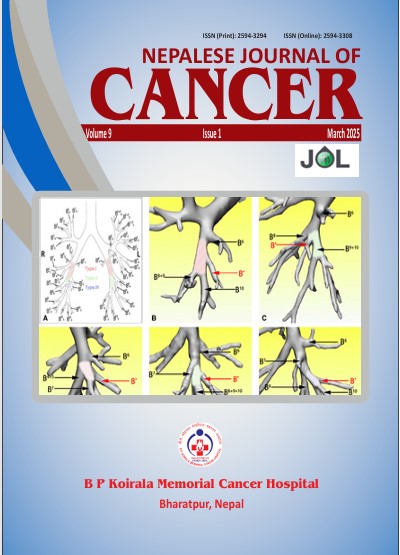FDA Approved Durvalumab for Limited-Stage Small Cell Lung Cancer
DOI:
https://doi.org/10.3126/njc.v9i1.77006Keywords:
SCLC, Durvalumab, survival, response rateAbstract
Limited-stage small-cell lung cancer (LS-SCLC) remains a highly aggressive malignancy with a historically poor prognosis despite advancements in concurrent chemoradiotherapy (cCRT). The introduction of immunotherapy, specifically PD-L1 inhibitors, has transformed treatment strategies by enhancing anti-tumor immune responses. Durvalumab, a fully human monoclonal antibody targeting PD-L1, has demonstrated significant clinical benefit and was recently FDA-approved for LS-SCLC following cCRT. The efficacy of durvalumab was established in the phase III ADRIATIC trial, which enrolled patients with LS-SCLC who achieved disease control post-cCRT. Durvalumab monotherapy significantly improved overall survival (OS) and progression-free survival (PFS) compared to placebo. The median OS for the durvalumab group was 55.9 months, a notable improvement over 33.4 months in the placebo arm (HR: 0.73; p = 0.0104). Similarly, PFS was prolonged, underscoring its role as a consolidation therapy.
Durvalumab’s safety profile highlights immune-related adverse events, particularly pneumonitis, observed in up to 26% of patients. Risk factors include pre-existing autoimmune conditions, obesity, and lower lung volume spared from radiation. Effective management necessitates early recognition, standardized monitoring protocols, and multidisciplinary collaboration to minimize complications without compromising treatment efficacy. While durvalumab represents a major advancement in LS-SCLC treatment, challenges persist. High recurrence rates and limited clinical trial data for frail and elderly patients emphasize the need for more inclusive research. Future directions include identifying predictive biomarkers and evaluating combination therapies, such as dual checkpoint blockade, to improve outcomes.
In conclusion, durvalumab’s approval marks a critical step forward in LS-SCLC management, offering significant survival benefits. Continued research is essential to address existing challenges and optimize therapeutic strategies, ultimately improving long-term outcomes for patients with this aggressive disease.
Downloads
Downloads
Published
How to Cite
Issue
Section
License
Copyright (c) 2025 Nepalese Journal of Cancer

This work is licensed under a Creative Commons Attribution 4.0 International License.
This license lets others distribute, remix, tweak, and build upon your work, even commercially, as long as NJC and the authors are acknowledged.
Submission of the manuscript means that the authors agree to assign exclusive copyright to NJC. The aim of NJC is to increase the visibility and ease of use of open access scientific and scholarly articles thereby promoting their increased usage and impact.




